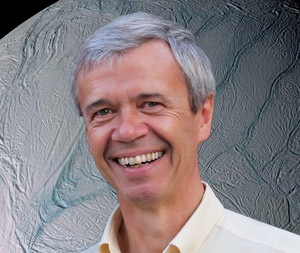PROMISES project by Christophe Sotin funded by the ERC
There is growing evidence that heavy organic molecules are a major component of the outer solar system bodies such as icy moons, comets, and Trans-Neptunian Objects (TNOs). Density profiles inferred from measurements of space missions require a low-density component in the core of the largest objects such as Ganymede and Titan.

These observations suggest that a previously overlooked low-density component, identified as carbonaceous organic matter (COM), is one of the three main components, in addition to ice and rocks, building planetary bodies that formed beyond the ice line.
However, there is a dearth of laboratory experiments and numerical simulations exploring the interaction of the heavy organic molecules constituting the COM with both the ice component (mainly H2O ices) and the rocky component (hydrated silicates, oxides and sulphides) at pressures relevant to icy moons.
Observations from space missions also demonstrated that most icy moons are differentiated into a refractory core and an outer hydrosphere that includes a liquid layer (deep ocean), thus the name of ocean worlds.
This raises the questions of the emergence of life at the ocean/core interface and of the habitability of ocean worlds. How does the presence of COM affect the thermal and chemical evolution of ocean worlds?
The interaction between COM, ice and rocks is therefore essential for understanding the evolution of ocean worlds and for assessing their habitability potential.
First, this project PROMISES (Presence and Role of Organic Matter in Icy Satellites and ExtraSolar planets) conducts laboratory experiments using diamond anvil cells (DAC) coupled with in situ Raman spectroscopy, a combination that is best suited for this kind of investigation.
Second, it develops a thermochemical evolution model that can handle the chemical reactions and the thermo-chemical properties of the three components. Third, it applies the results to the evolution of ocean worlds in our solar system and beyond.
The PROMISES project funded by ERC is led by Christophe Sotin, Professor exceptional class at Nantes University and LPG, for 5 years.
Published on April 3rd, 2022

